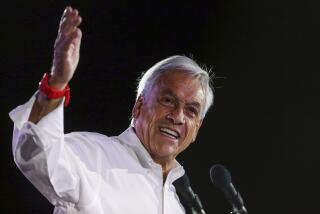SOUTH AMERICA : Presidential Role a Natural for Chile’s Frei : The leading candidate’s father launched popular reforms as the country’s leader in the 1960s.
- Share via
SANTIAGO, Chile — Barring some unforeseen turn of events, the next president of Chile will be Eduardo Frei, whose father launched popular social and economic reforms as president in the 1960s.
Frei, 50, easily won a primary election held last Sunday by parties of Chile’s governing coalition, known as the Concertacion. The coalition is scheduled to proclaim him as its presidential candidate Sunday.
Recent opinion polls indicate that Frei is unbeatable in presidential elections scheduled for Dec. 11. He is expected to win by an absolute majority, but if he doesn’t, he should be a shoo-in for the runoff.
“He runs no risk of losing,” said Sen. Andres Zaldivar, a former chairman of Frei’s Christian Democratic Party.
Patricio Aylwin, another Christian Democrat, won elections in 1989 and took office in March, 1990, succeeding Gen. Augusto Pinochet as president after 16 1/2 years of military rule. The Christian Democrats’ main partners in the coalition are the Socialist Party of the late President Salvador Allende, who died in Pinochet’s 1973 coup, and the Party for Democracy, formed in the 1980s by Socialists and moderate leftists.
Socialist Ricardo Lagos, who had served as education minister under Aylwin, challenged Frei for the coalition’s nomination but lost by a 3-2 margin in Sunday’s primary. About 600,000 members and supporters of the coalition parties voted in the primary, the first ever in Chile.
In an April opinion survey, 37% of those polled said they would vote in presidential elections for Frei and 19% for Lagos. The two allied candidates’ combined total overwhelmed the divided and dispirited right-wing opposition.
Political analysts say Frei benefits from the popularity of President Aylwin, whose conciliatory leadership has helped ease Chile through the transition from dictatorship to democracy.
After his primary victory, Frei vowed to work for continuation of “the great government of Patricio Aylwin.”
Despite contention for the coalition’s nomination, Frei has carefully cultivated the other main parties in the coalition to keep it together for the presidential elections. Lagos, accepting his loss, said: “Competition with Eduardo Frei has ended and collaboration with his government has begun.”
One of Frei’s greatest political assets is his name. His father, the late President Eduardo Frei, is remembered fondly by many Chileans for starting agrarian reform, promoting the welfare of both rural peasants and urban slum-dwellers, and taking over a controlling interest in huge copper mines owned by American companies.
President Frei was succeeded by Allende, whose Marxist-oriented government was marked by turmoil, leading to Pinochet’s 1973 coup.
Eduardo Frei Jr. is an engineer who achieved business success as a partner in a formerly government-owned construction company that was privatized by Pinochet’s regime. Frei became active in Christian Democratic politics in the late 1980s and won election to the national Senate in 1989.
More to Read
Sign up for Essential California
The most important California stories and recommendations in your inbox every morning.
You may occasionally receive promotional content from the Los Angeles Times.










